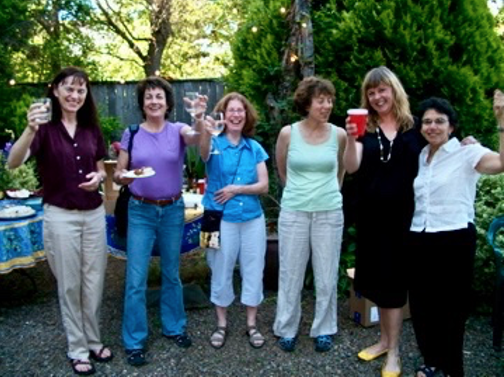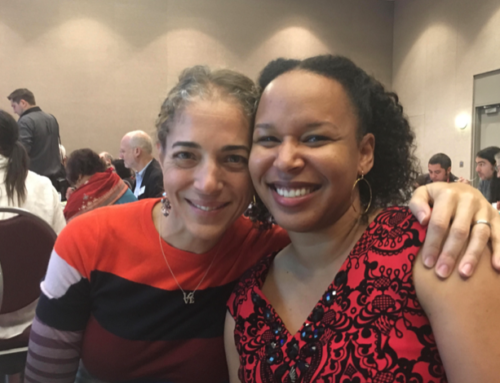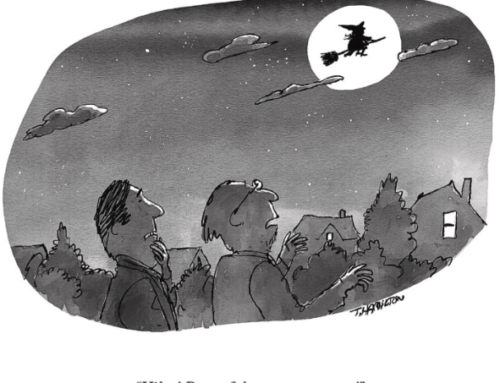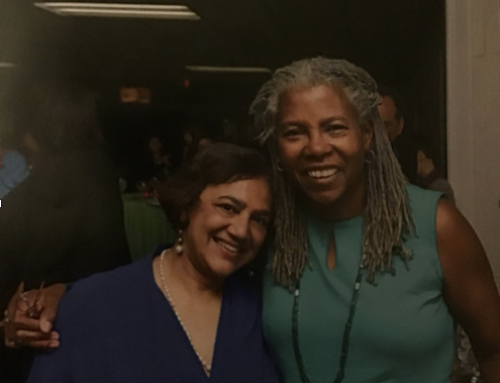I became what I call a “practicing feminist” in Bosnia-Herzegovina in the late 1990s while working for a local women’s NGO that was founded to support and empower women survivors of the 1992-95 war. I had earned a Bachelor’s degree with majors in psychology and English literature, and wanted to make a positive difference in the world. The daily conversations I had with Bosnian women about gendered violence, the war, and global politics, not to mention music, fashion, men, sexuality, feminism, and work, profoundly shaped my approach to the world and my role in it. My primary role for the organization was coordinating research and outreach with Romani women regarding domestic violence. The goal was to raise more awareness about women’s issues and contribute to policy advocacy in a dynamic and precarious postwar context (Erickson 2017).
While in Bosnia, I had the pleasure of meeting Cynthia Cockburn, a British feminist sociologist, who researched women’s activism, masculinity, and militarism (Cockburn 1998). As a mentor, Cynthia took into account the multiple roles and positions that we navigate in our professional and personal lives. For example, Cynthia is the only person to have read the novel that I wrote while living in Bosnia and she provided judicious feedback. In 1999, I met Elissa Helms, who was conducting dissertation field work on women’s activism in Bosnia (Helms 2013). She became my roommate and anthropology big sister, the first member of my anthropology family. Elissa introduced me to intersectionality theory, which considerably helped my colleagues and I to frame our research with Romani women. During this research, I came across the work of Carol Silverman, a highly regarded Romani studies scholar, folklorist, feminist, ethnomusicologist, and anthropologist, as well as a remarkable singer and folk dancer (Silverman 2012). I emailed her, and she sent me much-needed readings and encouragement for the project. She also encouraged me to apply to graduate school and mentored me through the application process. In fall 2002, I began my graduate studies in anthropology at the University of Oregon. As my first anthropology “mother,” Carol secured graduate funding for me, and recommended me for conferences and research grants. Her door was always open to me and she modeled how to be a more effective advocate for Roma.
Carol and Lamia Karim shepherded me through my Master’s thesis about Romani women in post-war Bosnia. Despite my love for my Bosnian friends and the region more broadly, my research interests began to shift away from Bosnia. My courses and transformative conversations with fellow graduate students led me to believe that I could best participate in decolonizing the discipline by working in the United States researching settler colonialism, racism, patriarchy, neoliberalism, and other systems of power. As I learned more about contemporary North American anthropology, particularly from Sandra (“Sandi”) Morgen, who became another anthropology “mother,” I decided to conduct my doctoral research in the United States.
My dissertation traced the history of refugee settlement to Fargo, North Dakota, and showed how culture, political economy, race, and institutional transformations collectively contributed to citizenship in the city (Erickson 2020). Carol, Sandi, and Lynn Stephen (along with human geographer Susan Hardwick), formed my dream team doctoral committee. Carol continued to oversee my research with Bosnian Roma, this time in Fargo, while Lynn became an academic “auntie” by encouraging me to expand my knowledge of North Dakota history and better explain differences and similarities between refugees and immigrants (Stephen 2013). Sandi introduced me to feminist political economy.
In 2006, my friend and “brother,” Patrick Hayden, and I began working with Sandi on her study of the politics of taxes in Oregon. Sandi trained us in ethnographic methods and met with us regularly to compare data and formulate arguments about what we would come to call “taxpayer identity politics” (Morgen and Erickson 2017). I left Oregon for a year to conduct my dissertation research in Fargo, and when I returned to Eugene, I resumed work on the tax project. By the time the Tea Party became a concerted political movement in 2009, we had already been studying taxes in Oregon for three years and our theoretical framework on taxpayer identity was only strengthened by the movement’s successes and later iterations.
In the meantime, Sandi recommended me as a student representative for the Center for the Study of Women and Society at the University of Oregon and for the Society for the Anthropology of North America, which became my intellectual home within the AAA. Sandi demonstrated the importance of academic service for both professional development and psychosocial support, which I view as collaborative mentoring. I gleaned much from the informal chatter among professors about the struggles of “work/life” balance, the demands of administrators and students, and racist and sexist practices in the academy. I came to know well Sandi’s extensive research background (Morgen 2002; Morgen, Acker, and Weigt 2010), but I also saw her as loving mother, good friend, deeply collaborative thinker, advocate for a broad array of progressive social issues, and lover of chocolate and dancing. I witnessed how much Sandi loved attending professional meetings where she would giddily catch up with friends and collaborators, discuss her work, and meet new scholars.

Pictured left to right: Madonna Moss (archaeologist), Lynn Stephen, Sandi Morgen, Ellen Herman (historian), Jennifer Erickson, and Carol Silverman at my 2010 graduation reception in Eugene, Oregon.
At one AAA meeting during which Patrick, Sandi, and I were presenting on our tax research, we arranged to have dinner together. One of Sandi’s friends questioned why she wanted to have dinner with graduate students, who she saw “all of the time.” She told us with her characteristic laugh that she loved our project and us. In 2010, as I prepared to leave Oregon, we had a retreat at the Oregon coast, where we conducted intense research discussions followed by walks on the beach and dinner, when Sandi would excitedly offer us life advice. Not long after, Sandi guided me through the process of accepting my first job offer. At another AAA meeting, a few years later, when I was pregnant and worried about how I would manage to raise a child with a partner who lived 100 miles away and already had three kids, she invited me to her hotel room where I spoke with her and another feminist anthropologist about the joys and challenges of parenting in academia. It was exactly what I needed.
I have chosen to highlight my work with Sandi because she played an especially strong role in training me as an anthropologist and demonstrating how to be an effective mentor. But she also did more than this by contributing so much to the field of anti-racist feminist anthropology, as well as to our understanding of the women’s healthcare movement, welfare and neoliberalism, and the politics of taxes.
In 2013, my partner, then 18-month-old daughter, and I sat with Sandi in her sunny backyard as our toddler played and shared food with Sandi’s dog. A few months later, Sandi would learn that she had ovarian cancer. After that, we struggled, of course, to find time to talk about our research. Sandi battled cancer while also serving as one of thirty Advocate Leaders with the Ovarian Cancer National Alliance. She wanted “to be able to help make some difference in policy and public awareness about this illness.” I was on the tenure track with a heavy teaching load, trying to publish my dissertation while raising a young child and in a long-distance relationship. Patrick left academia. Despite the challenges of time, distance, and other priorities, Sandi thoughtfully reminded us in an email on April 15, 2015, of our research anniversary, six years to the day after the Tea Parties first emerged and became the focus of our research. She wrote “with abiding respect. . . the strong feelings of intellectual excitement, political camaraderie, [and] just plain human caring” that we shared. And we did. Before she died, Sandi and I managed to submit one article about the tax project. Since her death in September 2016, I often wonder what Sandi would do, even though I already know that she would embrace research, mentoring, and advocacy. I’m presently finishing an article with Sandi as the co-author that extends our theory of taxpayer identity politics. I also strive to teach and mentor my own students in the way that Sandi, along with my other feminist anthropology family members, have mentored me.
References
Cockburn, Cynthia. 1998. The Space Between Us: Negotiating Gender and National Identities in Conflict. London: Zed Books.
Erickson, Jennifer. 2020. Race-ing Fargo: Refugees and the Transformation of Small Cities. Ithaca, NY: Cornell University Press.
Erickson, Jennifer. 2017. “Intersectionality Theory and Bosnian Roma: Understanding Violence and Displacement.” Romani Studies 27(1): 1-28.
Helms, Elissa. 2013. Innocence and Victimhood: Gender, Nation, and Women’s Activism in Postwar Bosnia-Herzegovina. Madison: University of Wisconsin Press.
Morgen, Sandra. 2002. Into Our Own Hands: The Women’s Health Movement in the United States, 1969-1990. New Brunswick, NJ: Rutgers University Press.
Morgen, Sandra, Joan Acker, and Jill Michele Weigt. 2010. Stretched Thin: Poor Families, Welfare Work, and Welfare Reform. Ithaca, NY: Cornell University Press.
Morgen, Sandra, and Jennifer Erickson. 2017. “Incipient “Commoning.” In Defense of the Public? Competing Varieties of Fiscal Citizenship in Tax- and Spending-Related Direct Democracy.” Focaal: Journal of Global and Historical Anthropology 79: 54–66.
Silverman, Carol. 2012. Romani Routes: Cultural Politics and Balkan Music in Diaspora. Oxford: Oxford University Press.
Stephen, Lynn. 2013. We Are the Face of Oaxaca: Testimony and Social Movements. Durham: Duke University Press.
Cite as: Erickson, Jennifer. 2021. “Feminist Praxis in Anthropology: My Feminist Lineage.” In “Genealogies of the Feminist Present: Lineages and Connections in Feminist Anthropology,” edited by Lynn Bolles and Mary H. Moran, American Ethnologist website, 24 May 2021, https://americanethnologist.org/features/collections/legacies-and-genealogies-in-feminist-anthropology/feminist-praxis-in-anthropology-my-feminist-lineage
Jennifer Erickson is Associate Professor and Assistant Department Chair of Anthropology, affiliated faculty in Women’s and Gender Studies and African American Studies, and a member of the steering committee for the Association of American University Professors at Ball State University. She is author of Race-ing Fargo: Refugees, Citizenship, and the Transformation of Small Cities (2020) and has published articles in Signs, Human Organization, Focaal, and Romani Studies.



